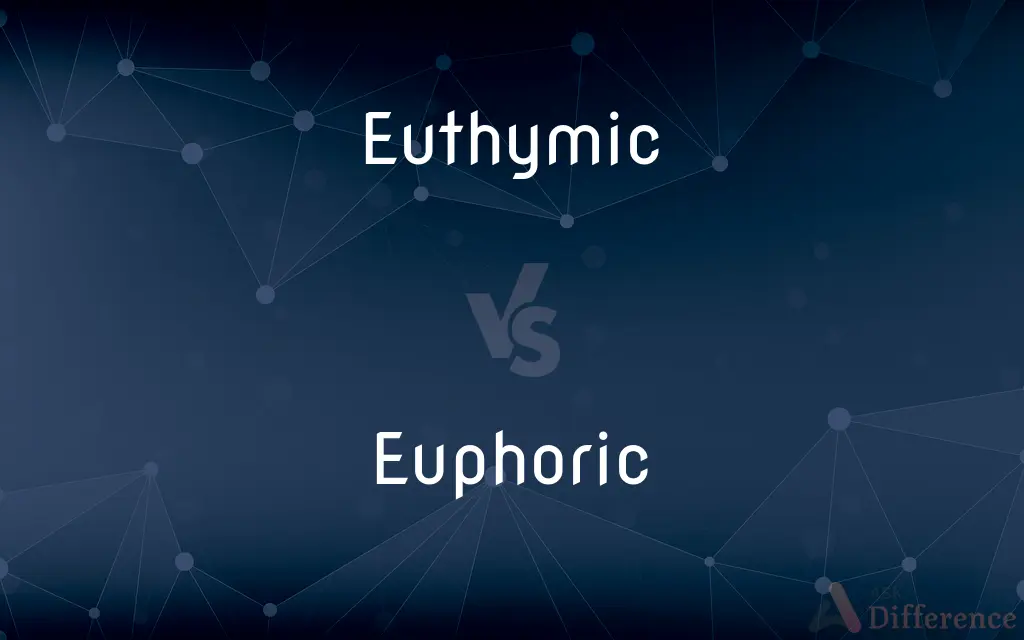Euthymic vs. Euphoric — What's the Difference?
By Tayyaba Rehman & Urooj Arif — Updated on April 4, 2024
Euthymic describes a state of normal, stable mood, while euphoric refers to an intensely elevated feeling of happiness or well-being.

Difference Between Euthymic and Euphoric
Table of Contents
ADVERTISEMENT
Key Differences
Euthymic is a term often used in psychiatry to describe a person's mood that is stable and in the range of what is considered 'normal' affectivity. It implies neither significant depression nor elevated mood, suggesting a balanced emotional state. Euphoric, on the other hand, denotes an extreme level of happiness or joy, often beyond what is typically encountered in everyday life. This state can be seen in various contexts, including as a symptom of certain psychiatric conditions or in response to certain stimuli or substances.
In the context of mental health, being euthymic is generally seen as the goal of treatment for mood disorders, indicating that the patient has achieved a stable and balanced mood state. Euphoria, while it may seem desirable, can be indicative of underlying issues such as bipolar mania or the effects of drug use, and it may not be sustainable or reflective of true emotional wellness.
Euthymia is characterized by a person’s ability to experience a full range of emotions in response to life events without extreme deviations that disrupt daily functioning. Euphoria, however, can be characterized by an exaggerated sense of well-being that is disproportionate to the situation, potentially leading to impaired judgment and risky behaviors.
The concept of euthymia includes a sense of contentment and well-being that is aligned with the individual's life circumstances. It allows for appropriate emotional responses that do not interfere with one’s ability to function. Conversely, euphoria can detach an individual from reality, creating a sense of happiness that may not reflect actual life conditions and can disrupt normal functioning.
Both euthymia and euphoria have their implications in psychological health and treatment. While euthymia represents a balanced and healthy emotional state, euphoria can signal a need for clinical attention, especially if it occurs without a clear cause or affects a person's ability to engage with reality effectively.
ADVERTISEMENT
Comparison Chart
Definition
A state of normal, stable mood.
An intensely elevated mood or happiness.
Desirability
Considered a healthy emotional state.
May indicate underlying psychological issues.
In Psychiatry
Goal of treatment for mood disorders.
Can be a symptom of mania or drug effects.
Emotional Range
Full range within normal variability.
Extreme, often disproportionate to circumstances.
Impact on Functioning
Supports daily functioning.
May impair judgment and disrupt normal functioning.
Compare with Definitions
Euthymic
Compatible with normal life activities.
Feeling euthymic made it easier for her to focus at work.
Euphoric
Feeling an intense, often unwarranted, happiness.
Winning the lottery made him feel euphoric.
Euthymic
Indicative of balanced emotional health.
The goal is to help patients maintain a euthymic state.
Euphoric
Potentially signaling underlying mental health issues.
Her doctor was concerned that her euphoric moods were not normal.
Euthymic
Characterized by a stable, baseline mood state.
After months of treatment, he now feels euthymic most days.
Euphoric
May arise from substance use or manic episodes.
The euphoria he felt was a warning sign of an impending manic episode.
Euthymic
Reflecting an absence of mood swings.
Her journal entries showed a euthymic mood throughout the week.
Euphoric
Experiencing heightened energy and well-being.
The crowd was euphoric after the concert.
Euthymic
The desired outcome in mood disorder management.
Achieving a euthymic state is crucial for long-term stability.
Euphoric
Associated with a loss of touch with reality.
In her euphoric state, she made several imprudent decisions.
Euthymic
Relating to euthymia
Euphoric
Characterized by or feeling intense excitement and happiness
A euphoric sense of freedom
Euphoric
A feeling of great happiness or well-being.
Euphoric
Feeling great well-being or elation or intense happiness; characterized by euphoria
In this moment, I am euphoric.
Euphoric
Productive of euphoria, causing great joy
Euphoric
A drug that causes euphoria; a euphoriant.
Euphoric
Strongly experiencing a feeling of well-being; feeling euphoria. Opposite of dysphoric.
Euphoric
Exaggerated feeling of well-being or elation
Common Curiosities
What does euthymic mean in psychology?
Euthymic refers to a person's mood state that is considered stable and within the normal range of emotions.
Why is euphoria considered a symptom in psychiatry?
Euphoria can be a symptom of certain conditions, such as bipolar disorder, indicating an imbalance in mood regulation that could lead to risky behaviors or decision-making.
Can a person be naturally euphoric without any underlying issues?
While moments of euphoria can occur naturally in response to positive life events, sustained euphoria without a clear cause might warrant a closer look for underlying issues.
How is euthymia achieved in those with mood disorders?
Euthymia is often achieved through a combination of medication, therapy, and lifestyle changes that help stabilize mood and improve overall well-being.
How do clinicians assess for euthymia?
Clinicians assess for euthymia through patient self-reports, observation, and sometimes standardized assessments to evaluate mood stability.
What are the risks of euphoric states?
Euphoric states can lead to impaired judgment, unrealistic optimism, and behaviors that may have negative consequences.
What impact does euphoria have on social relationships?
Euphoria can strain relationships due to unpredictability and behaviors that may seem out of character or risky.
Is euthymia the same as happiness?
Euthymia involves a stable mood and contentment, which can include happiness but is more about balance and emotional stability.
Can someone with bipolar disorder experience euthymia?
Yes, with appropriate treatment, individuals with bipolar disorder can achieve euthymic states between episodes of mania and depression.
Is it possible to transition from a euphoric to a euthymic state?
Yes, with appropriate intervention and treatment, individuals can transition from euphoric to more stable, euthymic mood states.
Share Your Discovery

Previous Comparison
Longitudinal vs. Axial
Next Comparison
Campaign vs. RallyAuthor Spotlight
Written by
Tayyaba RehmanTayyaba Rehman is a distinguished writer, currently serving as a primary contributor to askdifference.com. As a researcher in semantics and etymology, Tayyaba's passion for the complexity of languages and their distinctions has found a perfect home on the platform. Tayyaba delves into the intricacies of language, distinguishing between commonly confused words and phrases, thereby providing clarity for readers worldwide.
Co-written by
Urooj ArifUrooj is a skilled content writer at Ask Difference, known for her exceptional ability to simplify complex topics into engaging and informative content. With a passion for research and a flair for clear, concise writing, she consistently delivers articles that resonate with our diverse audience.














































